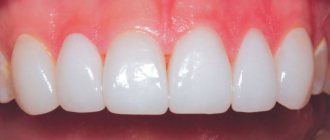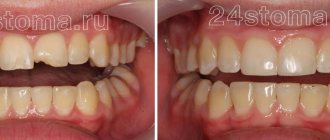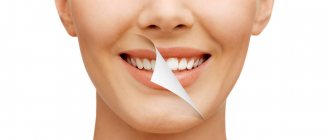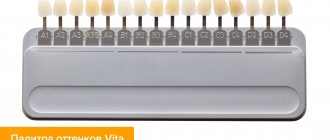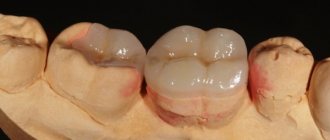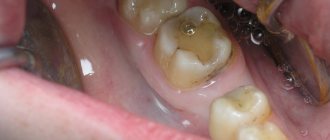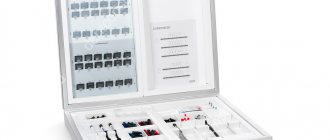To create an ideal smile, whitening your teeth is not enough - by nature they are still not snow-white and not always perfectly straight. You can get a smile like a Hollywood star only by installing veneers - thin plates that will completely mask enamel defects and make your teeth perfectly straight and snow-white.
Classic veneers are made of ordinary ceramics and are somewhat fragile. Emax ceramic veneers, a modern German development made from glass ceramics based on lithium disilicate, help achieve a more durable result. Such plates are much stronger, more durable and more aesthetically pleasing, require minimal tooth grinding and are visually indistinguishable from natural enamel, which makes them an ideal solution for creating a Hollywood smile.
Advantages over classic products
Dentists recommend E-MAX veneers to their patients for aesthetic restoration, since the products are endowed with quality indicators:
- The material has high strength , because it is a type of lithium silicate glass ceramics.
- Modern ceramic linings are produced by pressing. As a result of the absence of pores and tension in the material of the structure, it acquires a smooth, uniform surface.
This property allows the production of very thin veneers (thickness comparable to a contact lens). Thanks to this feature, there is no need to sharpen the teeth. - Fixed using dental glue , which protects the enamel from caries.
- The presence of a wide range of shades and transparency of the enamel is designed for a wide range of patients.
- Precise positioning of the structure on the tooth is achieved through 3D computer modeling, which eliminates all errors.
- The records are durable ; they do not fade or fade over time. Even after ten years, they will look like they were just made.
- Plaque does not accumulate on the onlays, and tartar does not form on them.
- The material is suitable even for allergy sufferers , has high biocompatibility and does not enter into chemical reactions with saliva and other liquids.
- There is no gum destruction around the restored area.
Conventional linings may have a number of disadvantages compared to E-MAX products:
- With insufficient care, food particles may get between the product and the dental element, which can trigger the development of caries.
- During installation, a mandatory manipulation is grinding off the protective layer of the unit being restored.
- Products can be made according to a template.
- Short service life (7 years with good care).
The characteristic features of conventional structures and those manufactured using E-MAX technology are given in the comparative table:
| Feature | E-MAX | Ceramics |
| Strength | High. The risk of chipping is minimal | Relative |
| Construction technology | CAD/CAM technology is used. The use of 3D modeling increases the accuracy of pad positioning | Manual creation from a cast or template |
| Installation | In some cases, fixation is possible without removing the enamel | Mandatory removal of enamel to the thickness of the plate |
| Aesthetics | Very high. The plates look natural. The color scheme matches the natural shade | High. Ceramic veneers are invisible on teeth |
| Lining life | From 15 years and older | On average 7-10 years |
| Cost in rubles | At least 20 thousand | From 10 thousand |
Ceramic veneers for teeth 2022
- Indistinguishable in the dentition
- Extremely thin - minimum tooth grinding
- Protect enamel from caries
- Does not lead to the development of periodontitis
- Does not accumulate plaque and tartar
- Suitable for allergy sufferers
- Does not lose color
- Laboratory manufacturing method
- High positioning accuracy on the tooth
- E-Max veneers have been used since 2005
- Service life 15-25 years
Among designs for anterior teeth, Emax veneers occupy a leading position in terms of the ratio of aesthetics and strength. This is not difficult to check: reviews of E-max veneers from patients are mostly positive. E-max Press technology: the main feature that distinguishes E-max veneers from other ceramic onlays is the pressed lithium silicate ceramic from which they are made. The German company Ivoclar Vivodent has patented an innovative composition, which has been recognized and is actively used to obtain veneers and E-max crowns in the best clinics in the world.
Important: Lithium disilicate is free of pores and defects in its structure due to baking under pressure in an oven. This prevents breakage and chipping; the E-max Press veneer can withstand even significant chewing loads that would cause conventional veneers to break (biting on hard foods, accidental impacts). Pros and cons: let's look at why Emax onlays are better than other ceramic veneers, and why you should choose them: aesthetics and naturalness: the color scale allows you to choose not only the shade, but also the degree of transparency of the material. This allows you to match the colors of Emax veneers as accurately as possible to the color of your remaining teeth.
Highest strength: depending on the technique, E-max veneers can withstand pressures from 470 MPa (IPS Impress technology) to 530 MPa (E-max IPS Impress CAD technology). Minimal preparation: to install the plate, you need to remove no more than 0.3 mm of enamel. Perfect fit: computer modeling of E-max veneers using the CAD technique allows you to achieve an exact fit to the neck of the tooth without cracks or gaps. This allows you to avoid darkening and caries under the structure in the future. The ability to see the final result of the work before it begins: computer modeling using CAD/CAM technology allows the patient to see his smile on the screen before and after the installation of microprostheses, as well as take part in their modeling, adjust the shape and color as desired. Absolute color fastness: due to the absence of pores, the German onlay does not absorb dyes from food, does not turn yellow or darken, as composite photopolymer veneers do. The approximate service life of E-max veneers is 10 years or more. The only significant drawback is the price of Emax veneers, which not everyone can afford to pay. But, if you consider that German microprostheses will last twice as long as conventional ones, which have a shelf life of no more than 5 years, then it is not so expensive. In addition, due to the absence of chips and breakages during wear, the price of Emax ceramic veneers may be even more profitable than the cost of onlays made from conventional ceramics.
Indications and contraindications. When are E-max veneers placed? IPS E-max veneers solve the same aesthetic problems as other similar designs:
Diastema and wide spaces between the front teeth; slight irregularities in the anterior group of teeth (protrusion or rotation around the axis of one or two teeth), in this case Emax ceramic veneers replace braces; unaesthetic color of the front teeth due to numerous restorations, hypoplasia or fluorosis; erosions and wedge-shaped defects of the necks of teeth; unsatisfactory shape or size of incisors and canines; extensive fillings and restorations on the front teeth, which cannot withstand the chewing load and periodically chip.
Judging by the reviews of E-max veneers, they work well on the upper front teeth, solving several problems at the same time. Some patients with increased aesthetic requirements have additional plates made for their lower teeth. It is also possible to fix ceramic plates on the lateral teeth, but in this case, a dental inlay or crown on zirconium dioxide will last longer, because they have a large area. Usually, onlays are fixed on 6-10 upper teeth at once, but this is not necessary. It is possible to install two or three units only on problem teeth.
The installation of E-max ceramic orthopedic veneers is contraindicated only in cases of direct bite, the presence of bruxism (teeth grinding) and the loss of a large number of lateral teeth. In the latter case, you must first do prosthetics, and only then read reviews of Emax Press veneers and decide on the choice of design for the front teeth.
Manufacturing stages A crown or E-max veneer is made jointly by a dentist and a dental technician, which takes 1-2 weeks. During this time, the patient visits the office no more than two times. The main stages of installation: preparation - under the E-max onlays, the doctor removes 0.2-0.3 mm of enamel using a bur. In some cases, if the patient has hypersensitive teeth or fear, the dentist pre-administers infiltration anesthesia. Taking impressions. Using silicone impression material and an impression tray, the doctor takes an impression of the teeth after preparation and passes it on to the technician. Shade selection: The dentist, together with the patient, selects the colors of the E-max veneers. Typically, the shade is the lightest on the central incisors and the darkest on the canines. To select shades, use the Emax Bleach veneer shade. Fixing temporary onlays: this is necessary in order to avoid walking with sharpened hypersensitive teeth for two weeks. Temporary veneers also keep gums from growing on the hard tissues of the tooth. The cost of E-max veneers increases slightly due to temporary structures, but the quality of work with them is also higher. Production of onlays in the laboratory by pressing or crystallization. Trying on and fixing the finished plates in the mouth: for this, the doctor uses a liquid photopolymer material. The protocol for fixing Emax veneers includes sequential acid etching, application of an adhesive (glue), and a fixing material both on the onlay itself and on the tooth. At the end, the onlay on the tooth is illuminated with a lamp to harden the photopolymer. Excess material is removed. Fixation must be carried out with a rubber dam (rubber scarf) to isolate it from saliva.
If you believe the reviews of Emax veneers, at least one or two corrections are required for the patient to get used to it and stop feeling the veneers. During correction visits, the doctor teaches proper hygiene and care of the plates.
Indications
Like any prosthetics, the use of onlays has certain indications and limitations for their installation.
Dental plates made in Germany allow you to get rid of the following disadvantages:
- changes in the color of the enamel associated with certain diseases, taking medications, smoking, excessive consumption of coloring drinks (coffee, tea) that cause spotting or yellowing;
- darkening of old fillings;
- presence of defects in the form of cracks, chips;
- incorrect orientation of the incisors (rotation around an axis, slight crowding);
- thinning and erosion of enamel;
- the presence of interdental gaps (diastema, trema);
- violation of the shape and position of the incisors due to malocclusion;
- in the absence of effect after other restoration techniques.
Features of the manufacture of Cerec veneers and the technique of their installation.
Let's talk here about the pros and cons of solid metal-ceramic crowns.
At this address https://www.vash-dentist.ru/protezirovanie/nesemnyie-p/koronki-np/zolotyie.html we will tell you in which case it is justified to install a gold crown on a tooth.
Advantages of metal-free crowns
Solid ceramics have the same light-refracting properties as the enamel layer of a natural tooth, so artificial crowns made of metal-free ceramics look natural. They are impossible to distinguish from your teeth.
The service life of such crowns is more than 15 years. They are very durable, so they are used for prosthetics of both front and side teeth. Such crowns can withstand normal chewing loads. The durability of crowns is also due to the fact that they fit tightly to the tooth stump, preventing the development of recurrent caries.
E-max ceramic crowns have a smooth surface. This prevents excessive accumulation of plaque and food debris on them. In addition, the material used for prosthetics is devoid of porosity, so the structure can be painted with food coloring.
E-max ceramics do not cause allergic reactions, inflammatory processes in the soft tissues of the oral cavity and a metallic taste in the mouth. This distinguishes it favorably from metal-ceramic structures, which can lead to similar undesirable consequences.
Contraindications
E-MAX veneers have a number of contraindications for installation. They are the same as for regular records:
- severe destruction of the incisors as a result of caries;
- pathological abrasion;
- malocclusion (straight);
- bruxism;
- presence of bad habits, for example, biting hard objects;
- destruction of the enamel on the inside or the presence of an old filling of large sizes;
- complete neglect of hygiene procedures;
- high risk of incisor injury (for example, when doing boxing).
Veneers will not help correct defects such as a straight bite or loss of a significant amount of tooth tissue.
Veneer installation using E-Max technology
E-Max veneers are placed in the same way as other veneers, in several stages. This usually takes from one to two weeks, but there are dentists that can do everything in one day. The installation of veneers using IPS Empress and IPS Empress CAD technologies is no different.
Stage 1
First, the doctor grinds down the teeth on which veneers will be installed. In some cases, this step is skipped when preparation can be avoided. Then the color of the future veneer is selected; the E-Max system has all possible options.
Stage 2
After this, the doctor receives an optical impression, which is then transferred to the laboratory, where the veneer is made using one technology or another. While this process lasts, temporary onlays are fixed to the patient’s ground teeth.
Stage 3
The installation of permanent structures does not take much time; the doctor attaches them using a special compound using a certain technology, and finally grinds and polishes them.
Manufacturing stages
Since the linings are individual products, their production involves several stages:
- The dental technician uses wax to model the plate so that it fits perfectly on the surface of the incisor.
- To make onlays, the technician uses blanks from E-MAX ceramics.
- The technician places such a blank in a special oven, where, by pressing, it is transformed into an overlay similar to the wax plate made earlier.
- Further processing of the finished product is carried out manually.
- The inner surface of the lining is roughened for a stronger fixation.
- To give the enamel a natural shine, the plate is coated with glaze.
- Next, a color scheme is selected to match the color of the patient’s teeth.
Watch the video to see how E max veneers are made.
What are E-max veneers
What veneers should you get to significantly improve your quality of life? Several offers from different price categories are relevant. But the most practical, beautiful and durable options are those made from E-max ceramics.
The thickness of the plates is 0.3 mm. Therefore, you don’t even need to get used to them. They are simply imperceptible to patients.
An impressive combination of characteristics:
- Quality.
- Aesthetics.
- Durability subject to operating rules.
- Long lifespan. Serve for 10 years or more.
The small thickness allows you to preserve the enamel as much as possible. The properties of the material are amazing - light transmission, the presence of many shades of the material guarantees the complete visual naturalness of the tooth.
Pre-treatment procedures and installation
Prosthetics with E-MAX veneers are carried out in several stages:
- The dentist prepares the surface of the incisor. If necessary, it is turned (removing the top layer of enamel 0.5-0.7 mm thick).
- An impression is then made using a special paste and sent to a dental laboratory.
- To prevent the patient from feeling discomfort, temporary onlays are made in the laboratory while the permanent plates are being made.
- Based on the impression, the technician makes a plaster model and then a temporary product.
- Using a set of samples, the dentist selects the desired shade to match the rest of the patient’s dentition.
Before finally fixing the permanent product, the dentist must make sure that the shape and shade match the element being restored.
If there are any deficiencies, the specialist will make adjustments. If the veneer fits perfectly on the incisor, then the next step should be to check the bite and contact with neighboring elements.
After checking all the indicators, if there are no comments, the dentist begins the final fixation of the structure on the tooth.
The restored element is treated with a special gel to enhance strength, and then cement is applied and a veneer is attached. Excess glue is removed with a special tool.
The main differences between Duo PCH veneers and products from other manufacturers.
This publication contains detailed information about ultranir.
Here https://www.vash-dentist.ru/protezirovanie/nesemnyie-p/viniryi-np/restavratsii-komponirami.html we will talk about compositers and indications for their use.
Rules of care
If certain care rules are followed, the service life of the plates can be extended.
After restoration, it is advisable to follow the dentist’s recommendations:
- Daily oral hygiene is required at least twice a day (morning and evening) using paste, brushes and other oral care devices. This will provide shine to the product.
- Avoid eating solid foods.
- It is forbidden to crack nuts or chew seeds.
- Minimize the consumption of products containing dyes.
- At least twice a year, undergo a preventive examination by a specialist.
- It is necessary to remove dental plaque once every six months.
- Use a mouthguard for bruxism.
- Visit the dentist at least once every six months to correct the dental plate.
Life time
The service life of ceramic linings with proper care is up to 10 years. But, products may fail earlier in the following cases:
- If the cement under the structure fails. Then the plate may fall out. The veneer must be taken to a dentist, who will professionally reattach it.
- If a hard object hits the elements of the dentition while eating, biting nuts, or uncorking bottles with your teeth, the lining may crack.
Price
The cost of dental restoration with E-MAX veneers depends on the region, the status of the clinic, the qualifications of the specialist and the clinical case. The average price for producing records in Moscow is at least 25,000 rubles.
The cost is comparable to the installation of zirconium structures. When planning dental restoration with modern onlays, it is necessary to take into account the possible costs of preparatory procedures: caries treatment, professional cleaning.
How much prosthetics costs in Moscow clinics can be seen from the table below:
| Procedure | Cost (in rubles) |
| Professional teeth cleaning | 3 000—4 000 |
| Ceramic or zirconium dioxide veneer | from 20 000 |
| Composite cover | from 5 000 |
| Lumineers | from 35 000 |
| Ultraneers | from 20 000 |
| Enamel whitening | from 10 000 |
| Diagnostics | from 1 000 |
| Taking impressions | 500 |
| Treatment of caries | from 1 500 |
| Making temporary crowns | from 4 000 |
| UltranirEnamik (Vita, Germany) | from 25 000 |
| Ultraneer (Lumineer) Cerinat (USA) | from 30 000 |
| Ultra-thin veneer e-max | from 25 000 |
EMAX veneers
EMAX veneers are veneers that are made by cutting a veneer from a blank. To make this type of veneers, square blocks of ceramic are cast, one specific standard color throughout the entire thickness, for example, A1. This is a significant drawback, since the entire thickness of the veneer is one color. When we look at such veneers in a patient’s mouth, for example, when smiling, teeth that are not naturally uniform in structure are immediately noticeable.
Unfortunately, in practice, the patient is not always satisfied with the aesthetics of the smile when using EMAX veneers, because if we look at the smile of a person with natural healthy teeth, we will see that a healthy tooth has a huge number of shades that manifest themselves not only during the day, but also during night light. Each person is individual, and everyone’s smile is also individual. If you look at your smile in the mirror, you will notice that closer to the gum at the base, the tooth has a more yellowish tint, at the incisal edge the tooth is more transparent or has a matte tint, and each individual tooth has its own special structure.
Emax veneers
Figure showing the monochromatic color of veneer A1 using Emax technology
Advantages and disadvantages of EMAX veneers.
The advantages include the cost, which is usually lower than the cost of feldspathic veneers, and the speed of production (1-2 days). Among the disadvantages, it is worth noting that the teeth are unnatural, the teeth are the same color and it will be immediately clear to anyone that your teeth are “not real.”
Reviews
Every person wants to have a flawless and healthy smile. Veneers are about aesthetics and preserving the functions of the restored units. But how effective are they and how long will they last?
Patients who have already tested this restoration method on themselves share their impressions. Many of them were pleased with the changes.
Some people complain that it takes a long time to get used to new teeth. In general, reviews of the use of E-MAX technology are positive.
You can also share your impressions of the restoration in the comments to this article.
If you find an error, please select a piece of text and press Ctrl+Enter.
Tags veneers fixed dentures
Did you like the article? stay tuned
Previous article
Rating of dental implant manufacturers according to experts and patients
Next article
Polyurethane dentures are an ideal budget solution to the problem
Feldspathic veneers.
Feldspar veneers are a layer-by-layer application of ceramics by hand by a dental technician, which is a highly artistic and precise work that requires extensive experience to achieve maximum color rendition.
The technician manually sequentially applies layers of ceramic to the future veneer, the thickness of which is a fraction of a millimeter. When applying, the technician takes into account the anthropometric initial data of the patient (description of the dentist, photographs of the pronunciation of certain sounds, photographs of sitting and standing, photographs in different lighting). All photographs are extremely important in order to see the overall picture of the patient’s teeth and smile line, as well as to plan the ideal shape of future veneers.
Feldspathic veneers are the product of an accurate and harmonious reproduction of a natural smile and this work can be confidently equated to art. Not every dentist will be able to distinguish a feldspathic veneer from a natural tooth.
Feldspar veneers
Advantages and disadvantages of feldspathic veneers
Among the advantages, one can immediately highlight 100% naturalness, which leaves no chance of understanding the patient’s natural teeth or veneers. The disadvantages include a slightly increased production time (on average 1.5-2 weeks), due to the thorough reproduction of all visual features of the patient’s teeth. The cost of feldspathic veneers is slightly higher, however, at the moment, Estet Dentistry installs such veneers at a more affordable price than other clinics that install mainly EMAX veneers. Due to regular promotional offers, please check the current price by phone!
Currently in Perm, only a few clinics provide services for the manufacture and installation of feldspathic veneers. The Estet Clinic is the first clinic in Perm to introduce this highly artistic and high-quality method of dental veneering. By contacting us, you receive a guarantee of a flawless smile that will delight you and everyone around you with its aesthetics and perfection.
The picture shows what a feldspathic veneer looks like, recreated from a prototype of a healthy human tooth.
